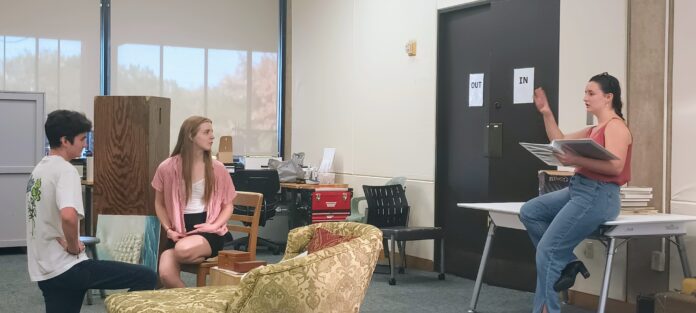A celebration of the art of theater within the senior studios
In interviewing two senior drama majors at the University of Dallas, a lot can be learned about the beauty and importance of the theater. The beauty of theater is being explored and showcased by only two drama majors this year within the senior studio. In interviewing them, Marcelle “Marcie” Van de Voorde and Maylis Quesnel both offered an in-depth understanding of the plays that they are each directing and showed the great love that they have for theater and its audience.
Like all studies at UD, the curriculum of the drama major requires that the student has a certain ambition in his or her work. Both women have studied their play since their junior year, while taking classes to ensure excellence in their directing, and to ensure a devoted understanding of the importance of their art. Quesnel said, “[UD] is an institution that challenges students, and sees that challenge as a good thing.”
The challenge of the senior studio begins with the drama majors reading numerous one-act plays their junior year. By focusing on the oneact, the soon-to-be directors learn the inner mechanisms of what constitutes a one-act play in preparation for their senior studio. In their classes, they learn how to interact with a script, how to communicate their vision to their actors, and how to entice an audience.
Van de Voorde said, “You pick your play because there is a part of you in it.” The act of directing a play is a very sobering process. In order to direct a play, you have to know yourself, so you can lead and serve better, as the whole process is a gift of self.
“I know what the core of the play is because I know myself,” Van de Voorde said. Theater is made of relationships, between all of those who work to produce a play, the play itself and the audience. You cannot ask the people you are directing for something when you yourself do not know the quality that you want or the purpose of what you are doing.
According to Van de Voorde, “The Magic Tower” by Tennessee Williams is a story of a husband and a wife whose home is their escape in the face of an unclear life. It is a play that asks what realities we have to face and what fantasies we create to live with them. Van de Voorde wants to use the play to analyze and understand the relationship between knowledge, love and commitment through the context of marriage.
Plays do not give easy answers and Van de Voorde does not want to hand the audience anything; she wants her audience members to discuss the play with each other. Theater is made of relationships, and those relationships help us to better understand truth.
According to Quesnel, “Electra” by Euripides, adapted by Adrienne Kennedy, is a story of a young girl who is dealing with the trauma of her father’s murder and is plotting with her brother to enact revenge. This play shows the deepest and darkest parts of our souls with its themes of family, trauma and revenge.
Quesnel, in fact, chose this play because of its difficulty. She explained, “There are few things harder than Greek tragedy.” She spoke about the power of theater and how her professors encourage their students to meet their expectations of producing a powerful show.
The study of tragedy has given Quesnel an opportunity to explore the beauty and meaning of suffering. Quesnel said, “Suffering is really almost the exaltation of the human in a strange, immersive way.”
Quesnel shared that her Christian faith has impacted the way she sees the play. “Immense suffering brings about immense good, and without the suffering there would be no good. That’s salvation history, right?” Quesnel said. With this play, Quesnel hopes to lead the audience, the actors and herself to a greater place. Everyone has experienced their unique suffering, so they have really allowed themselves to face this tragedy head on.
Both performances will take place in the Drama Department building from Thursday night, Nov. 30 until Saturday night, Dec. 2, 2023. Tickets are free for UD students and the short length of the one-act play makes these productions widely accessible to students. It seems like it’s time for a thought-provoking night at the theater.

